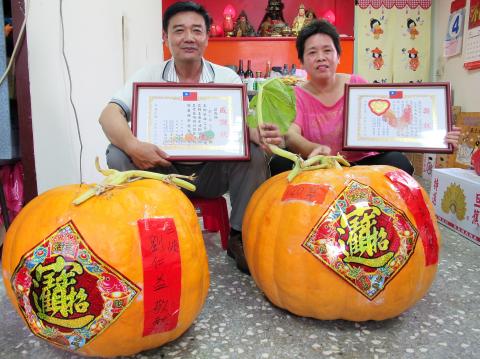Liu Jen-yi and Liu-Hsiung Hsiu-mei, a married couple living in New Taipei City’s Yingge District, are growing pumpkins in the mountains of Sansia District. This year the Lius delivered a real shock to visitors at an exhibition for local speciality produce held in Taoyuan County’s Lujhu Township, when they registered a pumpkin weighing a whopping 84kg to compete in the exhibition’s giant pumpkin contest. One of the Lius’ neighbors happily kissed and caressed the giant pumpkin, forthrightly saying the pumpkin had become “the glory of the Sansia and Yingge districts.”
Liu-hsiung said she and her husband started growing this particular pumpkin about half a year ago. In order to grow a pumpkin capable of winning first prize in the contest, they meticulously nurtured it every day, bearing in mind that a single sprout can only produce a single pumpkin. They also have years of experience, and secret tricks of the trade, but diligence is also crucially important.
This is not the first time the couple entered a pumpkin contest. Working as farmers for nearly three decades, they have received first prizes for their giant pumpkins several times in other contests. However, previous pumpkins usually only weighed around 50kg, making this the first time they were ever able to produce one of such gargantuan proportions. It still pales in comparison to the heaviest pumpkin in the world on record, which weighed well over 800kg.

Photo: Hsieh Chia-chun, Taipei Times
照片:自由時報記者謝佳君
Lin Mao-che, chief of Yongji Borough in Yingge District, said the average pumpkin normally weighs around 20kg at most, adding that it is extremely rare and unusual to see such heavy pumpkins. Since the Lius long have been known as exceptional pumpkin farmers in the area, a local restaurant owner who had reserved this pumpkin a year prior to the contest purchased it for NT$6,000 to serve as the “treasure of the restaurant.”
(LIBERTY TIMES, TRANSLATED BY TAIJING WU)
新北市鶯歌區劉仁益和劉熊秀梅夫婦在三峽區山間種南瓜。他們今年報名參加桃園縣蘆竹鄉農特產展示活動,展示的大南瓜足足有八十四公斤,讓不少觀眾吃了一驚,鄰居都直說,大南瓜是「三鶯之光」,開心得又親又摸。
劉熊秀梅說,他們大約半年前開始種這顆南瓜。為了種出冠軍南瓜,一株苗只能結一顆瓜,每天細心呵護,當然還有多年種植經驗,以及不能透露的「種瓜秘辛」,「但最重要的還是用心啦」!
這不是劉氏夫婦第一次參加南瓜比賽。務農二、三十年的他們,多次以巨大的南瓜獲得農產比賽第一名,但之前大概都只有五十幾公斤,這是首次種出這麼重的南瓜。但跟世界紀錄最重,超過八百公斤的南瓜而言就小巫見大巫。
鶯歌區永吉里長林茂哲說,一般常見南瓜頂多二十幾公斤,「能種到這麼重的南瓜真的很少見、很難得。」由於地方早已耳聞劉家是種瓜達人,有餐廳業者一年前就已預定這顆南瓜,並以六千元收購,未來這顆大南瓜將供奉在店裡當「鎮店之寶」。
(自由時報記者謝佳君)

★ Bilingual Story is a fictionalized account. 雙語故事部分內容純屬虛構。 “Get in. It’s pouring.” She slid into the back seat, drenched and silent. “Tissues?” the driver asked. “No, thank you,” she said. Water beaded off her hair, ran from her coat, and made a small lake on the vinyl. She kept her head down, long black strands clinging to her face. “Where to?” She gave an address. “Funeral?” he asked as they slipped into the Xinhai Tunnel, rain fading to a hollow drum. She glanced up, puzzled. “No. Why?” “Crematorium’s about the only thing here.” He caught her eyes in the mirror.

Have you ever dreamed of hiking Taiwan’s majestic Mt. Jade or visiting Peru’s breathtaking Machu Picchu? These adventures sound amazing, but there’s something you should know about first: “altitude sickness.” This condition strikes when you climb to a higher elevation too quickly. The higher you go, the thinner the air becomes, making it harder for your body to absorb oxygen. The symptoms usually begin within hours of reaching high altitudes — about 2,500 meters or higher. You might experience headaches, dizziness, nausea, shortness of breath, or extreme fatigue. These symptoms can last for several days. The severity of altitude sickness varies

A: Any fun events happening this weekend? B: Boyband Energy’s concerts and Taiwan’s first major male dance revue have both sparked anticipation recently. A: Energy staged a comeback last year — 15 years after they disbanded — and they’re now more popular than ever. B: Their megahit “Friday Night” even won Song of the Year at the Golden Melody Awards. A: To pay tribute to the Queen of Pop Madonna, they added her choreography of 16 continuous jump squats to their music video, prompting a “16-squat challenge” that went viral across Taiwan. Do you wanna try it out? A:

Week 24 詞法—名詞 1. 人們一致稱讚他。 ˇ People praised him unanimously. χ Peoples praised him unanimously. 註:people 作「人們」(= men and women)解時,是單數形式,作複數用。peoples 是「多個民族」、「各國人民」,不是「多數人」,如 the peoples of Asia(亞洲各民族、亞洲人民)。 2. 她為他做了一條新褲子。 ˇ She made him a new pair of trousers. χ She made him a new trousers. 註:scissors 和 trousers 等名詞習慣用複數形式。「一把剪刀」或「一條褲子」正統說法為 a pair of scissors 或 a pair of trousers。 3. 我們提前兩年完成了第二個五年計劃的主要目標。 ˇ We fulfilled the major objectives of the Second Five-Year Plan two years ahead. χ We fulfilled the major objectives of the Second Five-Years Plan two years ahead. 註:five-year 作為一個複合形容詞,year 不用複數。又如 a twelve-year-old boy、a five-dollar note、a one-hundred-meter race 等,也是一樣。 4. 他們決定買一輛新車。 ˇ They have made up their minds to buy a new car. χ